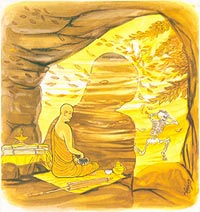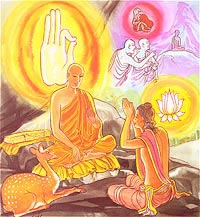61112 Tuesday LESSON 743 -Dhammapada Verses 7 and 8
Mahakalatthera Vatthu புலனின்ப விருப்புடன்,
அடங்கா பஞ்சேந்திரியங்களுடனும், மிகை வுணவுண்டும் ஊக்கமின்றி சோம்பலுடனும்,
வாழும் ஒருவனை, பலமற்ற மரத்தை சூரைக்காற்று தாக்குவது போன்று யமன்
தாக்குகிறான்.Verse 8.புலனின்பம் தீயது என்றெண்ணி பஞ்சேந்திரியங்கள் ஐ அடக்கி, மிதமாக உண்டு பக்தியும் ஊக்கமுடையவனை, சூரைக்காற்று கற்பாறையை அசைக்க முடியாதது போன்று அவனை யமனும் அசைக்க முடியாது.Verse 7: He who keeps his mind on pleasant objects, who is uncontrolled in his senses, immoderate in his food, and is lazy and lacking in energy, will certainly be overwhelmed by Mara, just as stormy winds uproot a weak tree.Verse 8: He who keeps his mind on the impurities (of the body), who is well-controlled in his senses and is full of faith and energy, will certainly be not overwhelmed by Mara, just as stormy winds cannot shake a mountain of rock. Dhammapada Verse 408 எவர் மிருதுவான ஈருலகங்களுக்கும் பயனுள்ள, உண்மை கூருகிரறாரொ, தன் பேச்சினால் எவரையும் கோபத்துக்கு ஆளாக்காமல் ருக்கிறாரோ அவரையே நான் பிராமணர் எஅ அழைப்பேன்.
Pilindavacchatthera VatthuVerse 408: Him I call a brahmana, who speaks gentle, instructive and true words, and who does not offend anyone by speech.திரிபிடகம் மூன்று தொகுப்புகள் ![]() TIPITAKA- from FREE ONLINE eNālāndā Research and
TIPITAKA- from FREE ONLINE eNālāndā Research and
Practice UNIVERSITY through http://sarvajan.ambedkar.org
புலனின்ப விருப்புடன்,
அடங்கா பஞ்சேந்திரியங்களுடனும், மிகை வுணவுண்டும் ஊக்கமின்றி சோம்பலுடனும்,
வாழும் ஒருவனை, பலமற்ற மரத்தை சூரைக்காற்று தாக்குவது போன்று யமன்
தாக்குகிறான்.
சுபானுபஸ்ஸிங் விஹரந்தங் -
இந்த்ரியேஸஜீ அசங்வுதங்
போஜன்ம் ஹி அமதஞ்ஞங் -
குஸீதங் ஹீநவீரியங்
தங்வே பஸஹதீ மாரோ -
வாதோருக்கங்வ துப்பலங்
 |
Verse 7. Laziness Defeats Spirituality
Explanation: Those who dwell on the attractiveness of sensual |
லனின்பம்
தீயது என்றெண்ணி பஞ்சேந்திரியங்கள் ஐ அடக்கி, மிதமாக உண்டு பக்தியும்
ஊக்கமுடையவனை, சூரைக்காற்று கற்பாறையை அசைக்க முடியாதது போன்று அவனை யமனும்
அசைக்க முடியாது
அசஜீபானு பஸ்ஸிங் விஹரந்தங் -
இந்த்ரியேஸு ஸுஸங்வுதங்
போஜன்ம் ஹி ச மத்தஞ்ஞங் -
ஸத்தங் ஆரத்த வீரியாங்
தங்வே நப்பஸஹதீ மாரோ -
வா தோ ஸேலங் பப்பதங்
 |
Verse 8. Spiritual Strength is Undefeatable
Explanation: Those who dwell on the unattractiveness of sensual |
Dhammapada Verses 7 and 8
Mahakalatthera VatthuSubhanupassim viharantam
indriyesu asamvutam
bhojanamhi camattannum
kusitam hinaviriyam
tam ve pasahati Maro1
vato rukkhamva dubbalam.Asubhanupassim viharantam
indriyesu susamvutam
bhojanamhi ca mattannum
saddham2 araddhaviriyam
tam ve nappasahati Maro
vato selamva pabbatam.Verse 7: He who keeps his mind on pleasant objects, who is uncontrolled in
his senses, immoderate in his food, and is lazy and lacking in energy, will
certainly be overwhelmed by Mara,3 just as stormy winds uproot
a weak tree.Verse 8: He who keeps his mind on the impurities (of the body), who is
well-controlled in his senses and is full of faith and energy, will certainly be
not overwhelmed by Mara, just as stormy winds cannot shake a mountain of
rock.
1. Maro/Mara: in this context kilesamara, the
defilements hindering the realization of Nibbana.2. saddham/saddha: According to the Commentary,
(a) unwavering (unshakable) faith in the Buddha, the Dhamma (the Doctrine) and
the Samgha (the Buddhist Religious Order) and
(b) faith or belief in kamma (action) and its results.3. Refer to 1.
The Story of Thera Mahakala
While residing in the neighbourhood of the town of Setabya, the Buddha
uttered Verses (7) and (8) of this book, with reference to Mahakala and his
brother Culakala. Mahakala and Culakala were two merchant brothers from the town
of Setabya. While travelling about with their merchandise on one occasion, they
had a chance to listen to a religious discourse given by the Buddha. After
hearing the discourse Mahakala asked the Buddha for admission to the Order of
the bhikkhus. Culakala also joined the Order but with the intention of coming
out of the Order and to bring out his brother along with him.Mahakala was serious in his ascetic practice at the cemetery (Sosanika
dhutinga) and diligently meditated on decay and impermanence. He finally
gained Insight and attained arahatship.Later, the Buddha and his disciples, including the brothers, happened to be
staying in the forest of Simsapa, near Setabya. While staying there, the former
wives of Culakala invited the Buddha and his disciples to their house. Culakala
himself went ahead to prepare seating arrangements for the Buddha and his
disciples. Once there, the former wives of Culakala made him change into lay
clothes.The next day, the wives of Mahakala invited the Buddha and his disciples to
their house hoping to do the same with Mahakala as the wives of Culakala had
done to Culakala. After the meal they requested the Buddha to let Mahakala
remain to “express appreciation” (anumodana). So the Buddha and
the other disciples left.Arriving at the village gate the bhikkhus expressed their dissatisfaction and
apprehension. They were dissatisfied because Mahakala was permitted to stay
behind and they were afraid that, like Culakala, his brother, Mahakala, too,
would be made to leave the Order by his former wives. To this, the Buddha
replied that the two brothers were not alike. Culakala indulged in sensual
pleasures and was lazy and weak; he was just like a weak tree. Mahakala, on the
other hand, was diligent, steadfast and strong in his faith of the Buddha, the
Dhamma and the Samgha; he was like a mountain of rock.Then the Buddha spoke in verse as follows:
Verse 7: He who keeps his mind on pleasant
objects, who is uncontrolled in his senses, immoderate in his food,
and is lazy and lacking in energy, will certainly be overwhelmed by Mara,
just as stormy winds uproot a weak tree.Verse 8: He who keeps his mind on the impurities
(of the body), who is well-controlled in his senses and is full of
faith and energy, will certainly be not overwhelmed by Mara,
just as stormy winds cannot shake a mountain of rock.
Meanwhile, the former wives of Mahakala surrounded him and tried to remove
his yellow robes. The thera, sensing their attitude, stood up and rising up into
the air by his supernormal powers passed through the roof of the house into the
sky. He landed at the feet of the Buddha at the very moment the Master was
coming to the end of his utterance of the above two stanzas. At the same time,
all the bhikkhus assembled there were established in Sotapatti Fruition.

Verse 408. A Brahmana Is He Who Gives Offence To None
அசுக்கஸங் விஞ்ஞாபதிங் -
கிரங் சச்சங் உதிரயெ
யாய நாபிஸயெ கங்சி -
தமஹங் ப்ரூமி பிராஹ்மணங்
Who utters speech instructive,
true and gentle too,
who gives offence to none,
that one I call a Brahmin True.
Explanation: His speech is true. His words are well-meaning,
constructive and not harsh. By his words he will not give offence
to anyone. Nor will his words provoke people. Such a person I declare
a true brahmana.
Dhammapada Verse 408
Pilindavacchatthera
Vatthu
Akakksam vinnapanim
giram sacca’ mudiraye
yaya nahhisaje kanci
tamaham brumi brahmanam.
Verse 408: Him I call a brahmana, who speaks
gentle, instructive and true words, and who does not offend anyone by speech.
The Story of Thera Pilindavaccha
While residing at the Veluvana
monastery, the Buddha uttered Verse (408) of this book, with reference to Thera
Vaccha, who was also known as Thera Pilindavaccha, due to his offensive ways.
Thera Pilindavaceha had a very
offensive way of addressing people: he would often say, “Come here, you
wretch”, or “Go there, you wretch” and such other things. Other
bhikkhus reported about him to the Buddha. The Buddha sent for him, and spoke to
him on the matter. Then, on reflection the Buddha found that for the past five
hundred existences, the thera had been born only in the families of the brahmins,
who regarded themselves as being superior to other people. So the Buddha said to
the bhikkhus, “Bhikkhus! Thera Vaccha addresses others as ‘wretch’ only
by force of habit acquired in the course of his five hundred existences as a
brahmin, and not out of malice. He has no intention of hurting others, for an
arahat does not harm others.”
Then the Buddha spoke in verse as
follows: